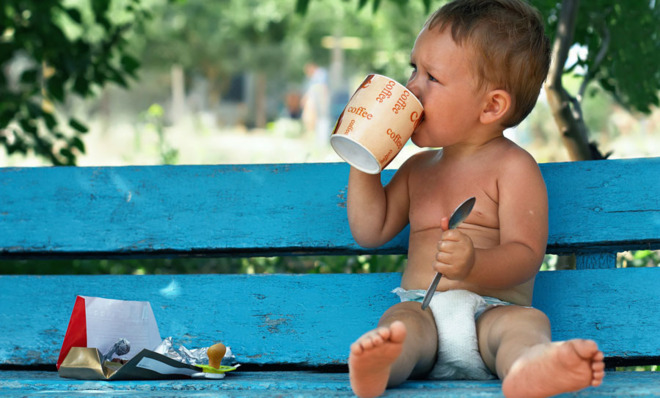Is it safe to caffeinate your kids?
Well, it's certainly not the best idea

A free daily email with the biggest news stories of the day – and the best features from TheWeek.com
You are now subscribed
Your newsletter sign-up was successful

Think back to your first cup of coffee: Did it come after dinner in college, as you prepared for your first all-nighter…or over breakfast in high school, as you struggled to wake up? For today's youth, the answer's more likely the latter. Kids are consuming caffeine at ever-earlier ages, and they're getting it from soda and energy drinks as well as from java. In 2013, U.S. poison centers reported 1,834 exposures to energy drinks by children 18 and younger, and 75 percent of all kids have some caffeine every day. Do we know enough about caffeine's effect on growing children — is it safe? Here's what the evidence says.
By affecting sleep, caffeine affects the brain development of adolescents.
"Adolescent sleep is very different than any other sleep in our lives. Teens go to sleep late, wake up late, and while they're sleeping their brains are becoming more efficient," says Amir Levine, a Columbia University clinical psychiatrist. For adolescents waking up early for school, drinking caffeine helps them wake up and focus — but they spend the day in what's effectively a constant state of jet lag, says Levine. After a few hours, the caffeine wears off, and typically more is consumed, a pattern that may lead to difficulties in falling asleep.
The Week
Escape your echo chamber. Get the facts behind the news, plus analysis from multiple perspectives.

Sign up for The Week's Free Newsletters
From our morning news briefing to a weekly Good News Newsletter, get the best of The Week delivered directly to your inbox.
From our morning news briefing to a weekly Good News Newsletter, get the best of The Week delivered directly to your inbox.
(More from World Science Festival: Inside the mystery serum that could save Ebola victims)
Caffeine does NOT stunt growth.
There are no studies that have demonstrated this association empirically. Jennifer Temple, a public health researcher at the University at Buffalo, believes this myth exists because growth hormones are released at night during sleep, implying to some that if caffeine disrupted sleep, it would disrupt growth hormone release and, consequently, stunt growth. But there is at the moment no compelling evidence to back this up.
It's deceptively easy for a child or teen to consume high doses of caffeine.
A free daily email with the biggest news stories of the day – and the best features from TheWeek.com
Moderate doses of caffeine can increase blood pressure and decrease heart rate.High doses can cause heart palpitations, dizziness, anxiety, diarrhea, and jitteriness. And the dosages, for kids, may be much less than you think, according to Temple: For an 8-9 year old weighing approximately 65 pounds, a moderate dose is 30-90 milligrams of caffeine, the amount in one cup of coffee; a high dose is more than 200 mg, the amount in 5 cans of caffeinated soda or one 5-Hour Energy shot. For a teenager weighing about 130 pounds, a moderate dose of caffeine is 60-180 mg, the amount in two cups of coffee; a high dose is over 300 mg, the amount in 7 cans of caffeinated soda or 3.5 Red Bull energy drinks.
(More from World Science Festival: The next big thing in telescopes)
Caffeine may affect teenage boys and girls differently.
Temple's own research indicates that, post-puberty, boys may be affected by caffeine more than girls. She recently did a study on the cardiovascular changes in boys and girls using caffeine that showed that boys had higher blood pressure and lower heart rates than girls. Temple also saw that at different stages of girls' menstrual cycles, they metabolized caffeine differently.
It's possible to develop a tolerance for caffeine.
"The effect of caffeine on attention and concentration may be less pronounced in someone who uses caffeine chronically," Temple says. "In addition, if someone is a chronic user who is tested under caffeine-deprivation conditions, they may appear to have difficulty concentrating due to the effects of caffeine withdrawal. When subsequently given caffeine, what might appear to be improvement might simply be a return to "baseline" levels of concentration or attention after reversal of withdrawal symptoms."
(More from World Science Festival: Uncovering the genetic roots of African-Americans)
Stopping a caffeine habit, for kids as well as for adults, can be harder than expected.
While caffeine has a short half-life, people can become dependent on it, reports Dr. William Warzak, professor of psychology at the University of Nebraska Medical Center. Caffeine intoxication, caffeine withdrawal, and caffeine use disorder were added to the Diagnostic and Statistical Manual of Mental Disorders (DSM-5) in 2013. Even if you've only been consuming small amounts of caffeine for a short time, when you stop, you can experience headaches, jitters, and even reduced attention spans.
The bottom line: Children and caffeine should probably not mix.
Because of the limitations of conducting research on children, there are still many unknowns when it comes to kids and caffeine. In the meantime, most researchers recommend that children stay off the stuff. "Personally and professionally, I do not think children and adolescents should have caffeine," says Temple. "Healthy sleep habits are so important for health, brain development, and academic performance that anything you give children that disrupts their sleep could have harmful secondary effects."
-
 The ‘ravenous’ demand for Cornish minerals
The ‘ravenous’ demand for Cornish mineralsUnder the Radar Growing need for critical minerals to power tech has intensified ‘appetite’ for lithium, which could be a ‘huge boon’ for local economy
-
 Why are election experts taking Trump’s midterm threats seriously?
Why are election experts taking Trump’s midterm threats seriously?IN THE SPOTLIGHT As the president muses about polling place deployments and a centralized electoral system aimed at one-party control, lawmakers are taking this administration at its word
-
 ‘Restaurateurs have become millionaires’
‘Restaurateurs have become millionaires’Instant Opinion Opinion, comment and editorials of the day